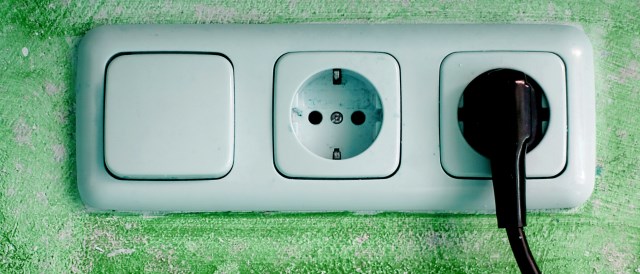In his last post, Craig Morris reviewed parts of a US labor union study, whose author calls it a “discussion document.” Craig accepts the invitation – and has one of his own.

Germans can pull the plug on their current energy provider and switch in order to save money or to choose green electricity. (Axel Hoffmann / pixelio.de)
I am always surprised to see what the Anglo world thinks of Germany, especially from people on “my side” of the energy transition debate. A lot of what I will say below was published in last year’s PDF entitled “Germany energy freedom.” This is the short version; if you want the full story, read the PDF afterwards (but stay here now).
The author of the labor union study on energy democracy (PDF) threw me completely off here:
Significantly, renewable energy has made the biggest strides (and created the most jobs) where governments have played a leading role and markets are less liberalized – such as China and Germany.
China and Germany, eh? I have lived in Germany for more than 20 years and never been to China, but if China is anything like Germany, it rocks. Here is a quick run-down of the “less liberalized” German energy market:
- Consumers can switch power producers at the end of the month, i.e. power providers have to compete with each other
- The government thus does not set power rates
- Citizens can make their own energy – as much as they want
- Utilities have to buy all of the power citizens sell to the grid
- Utilities have to pay producers of green power a rate (“feed-in tariff”) that provides a chance to turn a small profit
- Unlike utilities in the US, German utilities cannot charge you extra for your monthly bill if you have a solar roof, etc.
- It’s been this way, depending on the item above, for some 10-20 years
Citizens make up roughly half of the investments in renewables in Germany, compared to the 5% that the country’s Big Four utilities have invested. You, dear reader, compete eye to eye with your utility – but only in Germany. So what exactly is Germany “less liberalized” than?
The study would have been a great place to make it clear that, if we want to go beyond a mere switch to renewables and have energy democracy (the title of the campaign, for Pete’s sake…), we need the policy that gives us the German ownership outcome: feed-in tariffs. Here’s all the study has to say about the matter:
The policies that have contributed to this progress cannot be discussed in detail here, but they include feed–in tariffs (FITs) and renewable energy targets or standards.
What a missed opportunity! A 54-page study about energy democracy, but no time to explain that feed-in tariffs get the job done, while US-style targets just require utilities to go a little bit renewable (all the while, protecting their bottom line) – not allow citizens to build the renewables they want regardless of how much the competition from citizens puts energy corporations in the red?
So thanks to the Global Labor Institute for the open invitation to discuss your study. I hope my comments were useful. Now I have an invitation for you. There is a lot to criticize about Germany’s Energiewende, starting with the fact that it is currently mainly about electricity and not enough about all energy. But Germany is getting one thing right better than anyone else, hands-down: energy democracy. See above. Or better yet, get over here and see it for yourself.
Craig Morris (@PPchef) is the lead author of German Energy Transition. He directs Petite Planète and writes every workday for Renewables International.